(完整版)介词in-on-at及其练习附答案
12 介词in,on,at 全国通用版(含答案)

语法——介词in on atPart 1:知识点一、介词:是一种虚词,在句子中表示名词或代词与其他词之间的关系,不能单独做为句子成分,常位于名词或代词前面构成介词短语。
二、具体用法:常用介词1.in(1)表示方位:在……里面例句:There are three books in my bag.我书包里有三本书。
(2)表示地点:A.表示在大地方例句:I live in Hangzhou.我住在杭州。
B.表示属于该范围例句:Hei Longji ang lies in the north of China.黑龙江在中国北部。
(3)表示时间:A.表示一段时间(比较长)例:in summer在夏天in 2021在2021年in February 在二月B.表示在早上、下午、晚上例:in the morning/afternoon/evening(4)表示使用某种材料、语言等:例句:I can sing the song in English.我能用英语唱这首歌。
2.on(1)表示地点:在……上面例句:There is an apple on the desk.桌子上有一本书。
(2)表示时间:A.表示在具体某一天的上午、下午或晚上例:on June thirteenth在六月13日on the morning of May 1st在五月一日的早上B.表示在星期几的上午、下午或晚上例:on Friday在周五on Saturday afternoon在周六的下午2.at(1)表示在小地点:例:at school /home(2)表示时间点:例:at seven在七点at night在夜晚Part 2:练习一、用介词填空。
1.My mother begins to work ______ 8:00 ______ t he morning.2.Do you stay ______ home ______ weekend?3.They live ______ a new house now.4.Xinjiang is ______ the west of China.5.Lily usually have breakfast ______ the morning.6.They often have lunch ______ half past twelve.7.What’s this ______ English?8.There is a big gym ______ my school.9.She came to this city ______ 2020.10.It often snows here ______ winter.11.I will be back ______ a month.12.Don’t watch TV too much ______ the evening.13.Sally was born ______ May 11th.14.We don’t go to school ______ Saturday and S unday.15.They were happy ______ that time.16.______ the age of ten, I began to learn English.17.What do you often do ______ noon?18.______ a cold winter morning, I met her in the street.19.Mrs. Green came to Beijing ______ 2005.20.Children wake up very early ______ the morning ofChristmas Day.答案:1.at in2.at on3.in4.in5.in6.at7.in8.in9.in 10.i n 11.in 12.in 13.on 14.on 15.at 16.At 17.at 18.On 19.in 20.on。
广州小学英语五年级介词in-on-at及其练习附答案
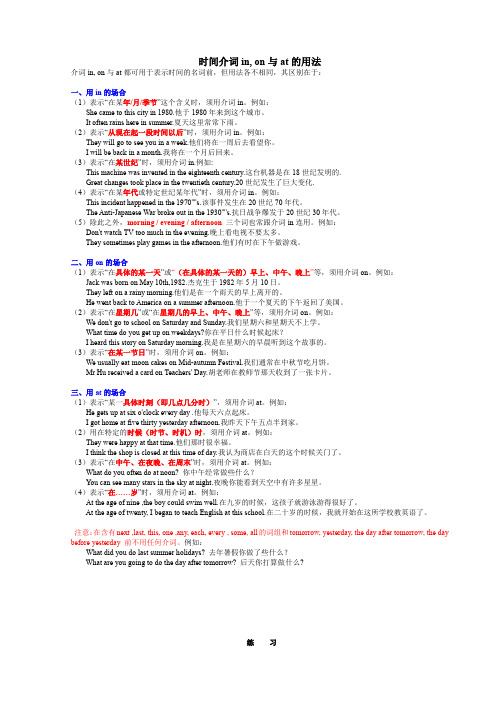
时间介词in, on与at的用法介词in, on与at都可用于表示时间的名词前,但用法各不相同,其区别在于:一、用in的场合(1)表示“在某年/月/季节”这个含义时,须用介词in。
例如:She came to this city in 1980.他于1980年来到这个城市。
It often rains here in summer.夏天这里常常下雨。
(2)表示“从现在起一段时间以后”时,须用介词in。
例如:They will go to see you in a week.他们将在一周后去看望你。
I will be back in a month.我将在一个月后回来。
(3)表示“在某世纪”时,须用介词in.例如:This machine was invented in the eighteenth century.这台机器是在18世纪发明的.Great changes took place in the twentieth century.20世纪发生了巨大变化.(4)表示“在某年代或特定世纪某年代”时,须用介词in。
例如:This incident happened in the 1970''''s.该事件发生在20世纪70年代。
The Anti-Japanese War broke out in the 1930''''s.抗日战争爆发于20世纪30年代。
(5)除此之外,morning / evening / afternoon三个词也常跟介词in连用。
例如:Don't watch TV too much in the evening.晚上看电视不要太多。
They sometimes play games in the afternoon.他们有时在下午做游戏。
二、用on的场合(1)表示“在具体的某一天”或“(在具体的某一天的)早上、中午、晚上”等,须用介词on。
广州小学英语五年级介词in-on-at及其练习附答案
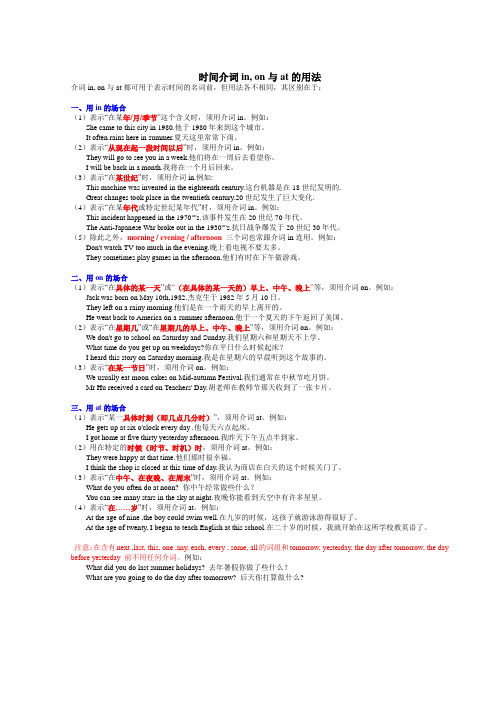
时间介词in, on与at的用法介词in, on与at都可用于表示时间的名词前,但用法各不相同,其区别在于:一、用in的场合(1)表示“在某年/月/季节”这个含义时,须用介词in。
例如:She came to this city in 1980.他于1980年来到这个城市。
It often rains here in summer.夏天这里常常下雨。
(2)表示“从现在起一段时间以后”时,须用介词in。
例如:They will go to see you in a week.他们将在一周后去看望你。
I will be back in a month.我将在一个月后回来。
(3)表示“在某世纪”时,须用介词in.例如:This machine was invented in the eighteenth century.这台机器是在18世纪发明的.Great changes took place in the twentieth century.20世纪发生了巨大变化.(4)表示“在某年代或特定世纪某年代”时,须用介词in。
例如:This incident happened in the 1970''''s.该事件发生在20世纪70年代。
The Anti-Japanese War broke out in the 1930''''s.抗日战争爆发于20世纪30年代。
(5)除此之外,morning / evening / afternoon三个词也常跟介词in连用。
例如:Don't watch TV too much in the evening.晚上看电视不要太多。
They sometimes play games in the afternoon.他们有时在下午做游戏。
二、用on的场合(1)表示“在具体的某一天”或“(在具体的某一天的)早上、中午、晚上”等,须用介词on。
介词in,on,at及其练习附答案(解析版)

介词in,on,at及其练习附答案(解析版)介词in、on和at在表示时间的名词前的使用有所不同。
具体区别如下:一、使用in的情况:1.表示“在某年/月/季节”时,需要使用介词in。
例如:她于1980年来到这个城市。
夏天这里经常下雨。
2.表示“从现在起一段时间以后”时,需要使用介词in。
例如:他们将在一周后去看望你。
我将在一个月后回来。
3.表示“在某个世纪”时,需要使用介词in。
例如:这台机器是在18世纪发明的。
20世纪发生了巨大变化。
4.表示“在某个年代或特定世纪某个年代”时,需要使用介词in。
例如:该事件发生在20世纪70年代。
抗日战争爆发于20世纪30年代。
5.除此之外,morning、evening和afternoon三个词也常与介词in连用。
例如:晚上看电视不要太多。
他们有时在下午做游戏。
二、使用on的情况:1.表示“在具体的某一天”或“(在具体的某一天的)早上、中午、晚上”等,需要使用介词on。
例如:杰克生于1982年5月10日。
他们是在一个雨天的早上离开的。
他于一个夏天的下午返回了美国。
2) 表示星期几或其时间,需使用介词on。
例如:我们星期六和星期天不上学。
平日你几点起床?我是在星期六的早晨听到这个故事的。
3) 表示某个节日,需使用介词on。
例如:我们通常在中秋节吃月饼。
胡老师在教师节那天收到了一张卡片。
1) 表示具体时间点,需使用介词at。
例如:他每天六点起床。
昨天下午五点半我到家了。
2) 表示特定的时节或时机,需使用介词at。
例如:他们那时很幸福。
我认为商店在白天的这个时候关门了。
3) 表示中午、夜晚或周末,需使用介词at。
例如:你中午经常做些什么?夜晚你能看到天空中有许多星星。
4) 表示某个年龄,需使用介词at。
例如:这个男孩在九岁的时候就游泳游得很好了。
When I was twenty years old。
I started teaching English at a school。
in,on 和 at 的用法区别习题(答案及解析)

介词 in,on 和 at 短小精悍,但用法差异很大,稍不留神就会用错。
一、用介词 in,on 或 at 完成下面的句子1、My sister was born _____ 1984.2、My birthday is _____ September.3、I left the keys _____ the counter.4、We are meeting _____ the stadium.5、I live _____ an apartment.6、My birthday is _____ June 25th.7、There is a great video _____ YouTube.8、I saw your profile _____ LinkedIn.9、She lives _____ Florida.10、Let's get connected _____ Facebook.11、He is _____ the phone.12、My appointment is _____ 5:00pm.13、See you _____ Monday.14、See you _____ a couple days.15、It will be _____ the end of the week.二、答案及解析1、in解析:修饰时间时,in 用于月,年,四季、世纪或很长的时间段,包括一天中的特定时间段,所以选 in。
2、in解析:同题1。
3、in解析:当描述一个物体或一个人的位置时, in 表示该物体在一个区域的边界内或包含在其他物体内,所以选 in。
4、at解析:修饰地点时,at 用于一个位置或地点,通常把它看作一个点,在这里把 stadium 看作一个点。
On the stadium 可能描述的是在体育馆的地面上,in the stadium 描述的是在体育馆内,而 at the stadium 可以指在体育馆里或是靠近体育馆的地方,因此这里选择 at 更合理。
In、on、at介词地点应用练习

In、on、at介词地点应用练习1. In、on、at的基本区别在使用英语的地点介词时,我们需要了解以下基本区别:- In用于指示一个相对较大的区域或封闭的空间。
- On用于指示一个平面或表面。
- At用于指示一个具体的点或位置。
2. In、on、at的具体应用2.1 In的应用- 用于指示大型地理区域或国家:- I live in China.(我住在中国。
)- 用于指示城市、街道、建筑物等封闭的空间:- He works in a hospital.(他在一家医院工作。
)- 用于指示具体的房间或房间内的位置:- The book is in the drawer.(书在抽屉里。
)2.2 On的应用- 用于指示平面或表面:- The cup is on the table.(杯子在桌子上。
)- 用于指示具体的日期或时间:- I have a meeting on Monday.(我星期一有个会议。
)2.3 At的应用- 用于指示具体的点或位置:- She is waiting for you at the bus stop.(她在公交车站等你。
)- 用于指示具体的建筑物或场所:- We will meet at the restaurant.(我们会在餐厅见面。
)- 用于指示特定的活动或事件:- I will see you at the party.(我会在派对上见到你。
)3. 其他注意事项- 有些地点介词的使用是习惯性的,需要根据具体语境进行学习和掌握。
- 地点介词的错误使用可能导致表达不准确或产生误解,因此需要多加练习和熟悉。
以上是对英语中地点介词In、on、at的应用进行的练习和总结。
---(注意:本文档中的内容仅供参考,具体情况还需根据实际语境进行判断。
)。
时间介词in,on,at用法练习答案解析

时间介词: in/on/atA. onB. atC. toD. in参考答案: D“年”前面用介词 in ,故正确答案为 D。
A. inB. onC. atD. to参考答案: A“月份”前面用介词 in ,故正确答案为 A。
A. atB. onC. inD. to参考答案: C“季节”前面用介词 in ,故正确答案为 C。
A. inB. atC. onD. of参考答案: B“时间点”前面用介词 at,“half past ten”是时间点,故正确答案为 B。
A. to; inB. at; inC. for; atD. at; to参考答案: B“时间点”前面用介词 at,在“早上”前面用 in ,故正确答案为 B。
My grandfather was born ______ Oct. 10, 1935 . (on/in)参考答案: on“具体到某一天”用介词 on ,故该空应填on 。
______ a cold winter morning, I met her in the street . (on/in)参考答案: on“具体到某一天的早上”用介词 on ,该句具体到了“在一个寒冷的冬天的早上” ,因此应该用介词 on 。
8 选择适当的单词填空They started off ______ an autumn afternoon . (on/in)参考答案: on“具体到某一天的下午”用介词 on ,该句具体到了“在一个秋天的下午” ,因此应该用介词 on。
A. onB. atD. during参考答案: A“具体到某一天晚上”用介词 on ,该句具体到了“在一个下雨的晚上” ,因此应该用介词 on ,故正确答案为 A。
A. in; onB. on; inC. on; onD. in; at参考答案: C“September 3, 1991”具体到了某一天,因此应该用介词 on ,“a cold morning”具体到了某一天的早上,因此也应该用介词 on ,故正确答案为 C。
时间介词_at_in_on_用法及练习
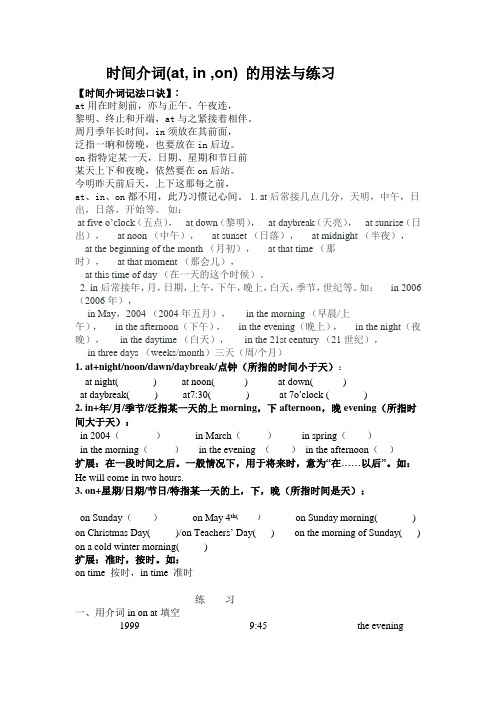
时间介词(at, in ,on) 的用法与练习【时间介词记法口诀】:at用在时刻前,亦与正午、午夜连,黎明、终止和开端,at与之紧接着相伴。
周月季年长时间,in须放在其前面,泛指一晌和傍晚,也要放在in后边。
on指特定某一天,日期、星期和节日前某天上下和夜晚,依然要在on后站。
今明昨天前后天,上下这那每之前,at、in、on都不用,此乃习惯记心间。
1. at后常接几点几分,天明,中午,日出,日落,开始等。
如:at five o’clock(五点), at down (黎明), at daybreak (天亮), at sunrise (日出), at noon (中午), at sunset (日落), at midnight (半夜),at the beginning of the month (月初), at that time (那时), at that moment (那会儿),at this time of day (在一天的这个时候)。
2. in后常接年,月,日期,上午,下午,晚上,白天,季节,世纪等。
如: in 2006(2006年),in May,2004 (2004年五月), in the morning (早晨/上午), in the afternoon (下午), in the evening (晚上), in the night (夜晚), in the daytime (白天), in the 21st century (21世纪),in three days (weeks/month)三天(周/个月)1. at+night/noon/dawn/daybreak/点钟(所指的时间小于天):at night( ) at noon( ) at down( )at daybreak( ) at7:30( ) at 7o’clock ( )2. in+年/月/季节/泛指某一天的上morning,下afternoon,晚evening(所指时间大于天):in 2004()in March()in spring()in the morning()in the evening ()in the afternoon()扩展:在一段时间之后。
译林版英语七上时间介词oninat用法练习含答案和解析

时间介词(at, in ,on) 的用法与练习【时间介词记法口诀】:at用在时刻前,亦与正午、午夜连,黎明、终止和开端,at与之紧接着相伴。
月份季节长时间,in须放在其前面,泛指一晌和傍晚,也要放在in后边。
on指特定某一天,日期、星期和节日前某天上下和夜晚,依然要在on后站。
今明昨天前后天,at、in、on都不用练习一、用介词in on at填空___in___1999 ___at____9:45 __in___the evening___on____Monday evening ___in_____June ____in____the afternoon___at____noon ___at___night __on____Children’s Day___on___Teachers’Day ___at____8 o’clock ___in____Summer____in___May __in____May,1999 ___on_____May15th,1999年月前面用介词in年月日,月日前面用on在早中晚餐或餐点前用介词at at lunch at supper at lunchtime二、单选( B ) 1. Children get gifts ____ Christmas(圣诞节) and ____ their birthdays.A. on; onB. at; onC. in; inD. in; on( A ) 2.----There is nothing ____tomorrow afternoon, is there? -----No. We can have a game of table tennis.A. onB. inC. outD. up具体某一天的上下午,晚上,夜里,要用介词on如:on Friday morning on yesterday afternoon on summer evening on the night of 9 May,2015 ( A ) 3. A lot of students in our school were born____March, 1981.A. inB. atC. onD. since年月前面用in( A ) 4. He suddenly returned____ a rainy night.A. onB. atC. inD. during上午,下午,晚上,夜里前面出现了修饰词,用介词on( A ) 5. My grandfather was born____Oct. 10, 1935.A. onB. inC. atD. of年月日前面用介词on( A ) 6. The train is starting___five minutes.A. inB. atC. forD.stillin+时间段表示在这个时间段内( B ) 7. Mike does his exercises ____ seven _____ the evening.A. on; toB. at; inC. by; ofD. at; on( B ) 8. Children wake up very early____the morning of Christmas Day.A.inB. onC. forD. at具体某一天的上下午,晚上或夜里用介词on( B ) 9 ____ a cold winter morning, I met her in the street.A. InB. OnC. AtD. For( B ) 10 It happened to be very cold____ the morning of our sports meeting.A. atB. onC. withD. of( B ) 11. Why did you get up so early ___ this morning.A. onB. /C. atD. in( C ) 12. He went to Shanghai___ September 3, 1991 and came back___ a cold morning last year.A. in; onB. on; inC. on; onD. in; in( A ) 13. Lucy was born____ the night of May 12, 1984. . ...A. onB. inC. atD. to( D ) 14. Mrs Brown came to China ____ 1996.A.onB. ofC. to,D. in( A/C ) 15 ___ the morning of November 20, 1915, the workers came to Chicago to show their mourning of Joe Hill.A. OnB. InC. OnD. At( B ) 16. Ann moved___Hangzhou___September, 1992.A. /; inB. to; inC. to; on D, in; in( D ) 17. They started off___an autumn afternoon.A. duringB. atC. inD. on( B ) 18. He often goes ____ school ____ six thirty ____ the morning.A. for; to; inB. to; at; inC. to; for; at D, for; at; to( D ) 19. He arrived ___ Shanghai ___ 9: 30 ___ March 5. A. at; in; at B. to; on; at C. in; on; at D. in; at; on( B ) 20.The English teacher told me to get there____ half past ten.A: in B. at C. on D. of特别注意at breakfast/lunch/supper/dinnerat dawn/night/noon/midnight无介词every/this/last/next day/morning/afternoon/evening/nightyesterday today tomorrow。
时间介词in,on,at用法练习答案解析

时间介词:in/on/at1. Mrs Brown came to China ______ 1996.A. onB. atC. toD. in参考答案:D“年”前面用介词in,故正确答案为D。
2. Ann moved to Suzhou ______ September, 1992.A. inB. onC. atD. to参考答案:A“月份”前面用介词in,故正确答案为A。
3. My favourite season is winter because I can skate ______ winter.A. atB. onC. inD. to参考答案:C“季节”前面用介词in,故正确答案为C。
4. The English teacher told me to get there ______ half past ten.A. inB. atC. onD. of参考答案:B“时间点”前面用介词at,“half past ten”是时间点,故正确答案为B。
5. He often goes school ______ six thirty ______ the morning.A. to; inB. at; inC. for; atD. at; to参考答案:B“时间点”前面用介词at,“在早上”前面用in,故正确答案为B。
6.选择适当的单词填空My grandfather was born ______ Oct. 10, 1935. (on/in)参考答案:on“具体到某一天”用介词on,故该空应填on。
7.选择适当的单词填空______ a cold winter morning, I met her in the street. (on/in)参考答案:on“具体到某一天的早上”用介词on,该句具体到了“在一个寒冷的冬天的早上”,因此应该用介词on。
8选择适当的单词填空They started off ______ an autumn afternoon. (on/in)参考答案:on“具体到某一天的下午”用介词on,该句具体到了“在一个秋天的下午”,因此应该用介词on。
(完整版)时间介词_at_in_on_用法及练习

时间介词(at, in ,on) 的用法与练习【时间介词记法口诀】:at用在时刻前,亦与正午、午夜连,黎明、终止和开端,at与之紧接着相伴。
周月季年长时间,in须放在其前面,泛指一晌和傍晚,也要放在in后边。
on指特定某一天,日期、星期和节日前某天上下和夜晚,依然要在on后站。
今明昨天前后天,上下这那每之前,at、in、on都不用,此乃习惯记心间。
1. at+night/noon/dawn/daybreak/点钟(所指的时间小于天):at night( ) at noon( ) at down( )at daybreak( ) at7:30( ) at 7o’clock ( )2. in+年/月/季节/泛指某一天的上morning,下afternoon,晚evening(所指时间大于天):in 2004()in March()in spring()in the morning()in the evening ()in the afternoon()扩展:在一段时间之后。
一般情况下,用于将来时,意为“在……以后”。
如:He will come in two hours.3. on+星期/日期/节日/特指某一天的上,下,晚(所指时间是天):on Sunday()on May 4th( )on Sunday morning( ) on Christmas Day( )/on Teachers’ Day( ) on the morning of Sunday( ) on a cold winter morning( )扩展:准时,按时。
如:on time 按时,in time 准时练习一、用介词in on at填空______1999 _______9:45 _______the evening _______Monday evening ________June ________the afternoon _______noon ______night ______Children’s Day______Teachers’Day _______8 o’clock _______Summer_______May ______May,1999 ________May15th,1999 二、单选( ) 1. Children get gifts ____ Christmas(圣诞节) and ____ their birthdays.A. on; onB. at; onC. in; inD. in; on( ) 2.----There is nothing ____tomorrow afternoon, is there? -----No. We can have a game of table tennis.A. onB. inC. outD. up( ) 3. A lot of students in our school were born____March, 1981.A. inB. atC. onD. since( ) 4. He suddenly returned____ a rainy night.A. onB. atC. inD. during( ) 5. My grandfather was born____Oct. 10, 1935.A. onB. inC. atD. of( ) 6. The train is starting___five minutes.A. inB. atC. forD.still( ) 7. Mike does his exercises ____ seven _____ the evening.A. on; toB. at; inC. by; ofD. at; on( ) 8. Children wake up very early____the morning of Christmas Day.A. inB. onC. forD. at( ) 9 ____ a cold winter morning, I met her in the stfeet.A. InB. OnC. AtD. For( ) 10 It happened to be very cold____ the morning of our sports meeting.A. atB. onC. withD. of( ) 11. Why did you get up so early ___ this morning.A. onB. /C. atD. in( ) 12. He went to Shanghai___ September 3, 1991 and came back___ a cold morning last year.A. in; onB. on; inC. on; onD. in; ia( ) 13. Lucy was born____ the night of May 12, 1984. . ...A. onB. inC. atD. to( ) 14. Mrs Brown came to China ____ 1996.A.onB. ofC. to,D. in( ) 15 ___ the morning of November 20, 1915, the workers came to Chicago to show their mourning of Joe Hill.A. OnB. InC. OnD. At( ) 16. Ann moved___Hangzhou___September, 1992.A. /; inB. to; inC. to; on D, in; in( ) 17. They started off___an autumn afternoon.A. duringB. atC. inD. on( ) 18. He often goes ____ school ____ six thirty ____ the morning.A. for; to; inB. to; at; inC. to; for; at D, for; at; to( ) 19. He arrived ___ Shanghai ___ 9: 30 ___ March 5. A. at; in; at B. to; on; at C. in; on; at D. in; at; on( ) 20.The English teacher told me to get there____ half past ten.A: in B. at C. on D. of基数词与序数词专项练习一、知识归纳①基数词变序数词的规律:口诀:基变序,有规律,结尾加上th。
(完整版)介词in-on-at及其练习附答案

时间介词in, on与at的用法介词in, on与at都可用于表示时间的名词前,但用法各不相同,其区别在于:一、用in的场合(1)表示“在某年/月/季节”这个含义时,须用介词in。
例如:She came to this city in 1980.他于1980年来到这个城市。
It often rains here in summer.夏天这里常常下雨。
(2)表示“从现在起一段时间以后”时,须用介词in。
例如:They will go to see you in a week.他们将在一周后去看望你。
I will be back in a month.我将在一个月后回来。
(3)表示“在某世纪”时,须用介词in.例如:This machine was invented in the eighteenth century.这台机器是在18世纪发明的.Great changes took place in the twentieth century.20世纪发生了巨大变化.(4)表示“在某年代或特定世纪某年代”时,须用介词in。
例如:This incident happened in the 1970““““s.该事件发生在20世纪70年代。
The Anti-Japanese War broke out in the 1930““““s.抗日战争爆发于20世纪30年代。
(5)除此之外,morning / evening / afternoon三个词也常跟介词in连用。
例如:Don“t watch TV too much in the evening.晚上看电视不要太多。
They sometimes play games in the afternoon.他们有时在下午做游戏。
二、用on的场合(1)表示“在详尽的某一天”或“(在详尽的某一天的)早上、中午、晚上”等,须用介词on。
例如:Jack was born on May 10th,1982.杰克生于1982年5月10日。
(完整版)时间介词_at_in_on_用法及练习.doc

时间介词 (at, in ,on)的用法与练习【介法口】 :at 用在刻前,亦与正午、午夜,黎明、止和开端, at 与之接着相伴。
周月季年, in 放在其前面,泛指一晌和傍晚,也要放在in 后。
on 指特定某一天,日期、星期和日前某天上下和夜晚,依然要在on 后站。
今明昨天前后天,上下那每之前,at、 in、on 都不用,此乃心。
1. at+night/noon/dawn/daybreak/ 点(所指的小于天):at night()at noon()at down()at daybreak()at7:30()at 7o’clock ()2.in+年 /月/季 /泛指某一天的上 morning ,下 afternoon ,晚 evening(所指大于天):in 2004()in March()in spring()in the morning()in the evening ()in the afternoon()展:在一段之后。
一般情况下,用于将来,意“在⋯⋯ 以后”。
如:He will come in two hours.3.on+星期 /日期 /日 /特指某一天的上,下,晚(所指是天):on Sunday()on May 4th()on Sunday morning() on Christmas Day()/on Teachers’Day()on the morning of Sunday( ) on a cold winter morning()展:准,按。
如:on time 按, in time 准练习一、用介 in on at 填空______1999_______9:45_______the evening _______Monday evening________June________the afternoon _______noon______night______Children ’s Day______Teachers’Day_______8 o’clock_______Summer_______May______May,1999________May15th,1999 二、单选() 1. Children get gifts ____ Christmas( 圣诞节 ) and ____ their birthdays.A. on; onB. at; onC. in; inD. in; on() 2.----There is nothing ____tomorrow afternoon, is there? -----No. We can have a game of table tennis.A. onB. inC. outD. up() 3. A lot of students in our school were born____March, 1981.A. inB. atC. onD. since() 4. He suddenly returned____ a rainy night.A. onB. atC. inD. during() 5. My grandfather was born____Oct. 10, 1935.A. onB. inC. atD. of() 6. The train is starting___five minutes.A. inB. atC. forD.still() 7. Mike does his exercises ____ seven _____ the evening.A. on; toB. at; inC. by; ofD. at; on() 8. Children wake up very early____the morning of Christmas Day.A. inB. onC. forD. at() 9 ____ a cold winter morning, I met her in the stfeet.A. InB. OnC. AtD. For() 10 It happened to be very cold____ the morning of our sports meeting.A. atB. onC. withD. of() 11. Why did you get up so early ___ this morning.A. onB. /C. atD. in() 12. He went to Shanghai___ September 3, 1991 and came back___ a cold morning last year.A. in; onB. on; inC. on; onD. in; ia() 13. Lucy was born____ the night of May 12, 1984. . ...A. onB. inC. atD. to() 14. Mrs Brown came to China ____ 1996.A.onB. ofC. to,D. in() 15 ___ the morning of November 20, 1915, the workers came to Chicago to show their mourning of Joe Hill.A. OnB. InC. OnD. At() 16. Ann moved___Hangzhou___September, 1992.A. /; inB. to; inC. to; on D, in; in() 17. They started off___an autumn afternoon.A. duringB. atC. inD. on() 18. He often goes ____ school ____ six thirty ____ the morning.A. for; to; inB. to; at; inC. to; for; at D, for; at; to() 19. He arrived ___ Shanghai ___ 9: 30 ___ March 5. A. at; in; at B. to; on; at C. in; on; at D. in; at; on() 20.The English teacher told me to get there____ half past ten.A: in B. at C. on D. of基数词与序数词专项练习一、知识归纳①基数词变序数词的规律:口诀:基变序,有规律,结尾加上th 。
七选择恰当的介词补全句子(10分)at on In1. Ou
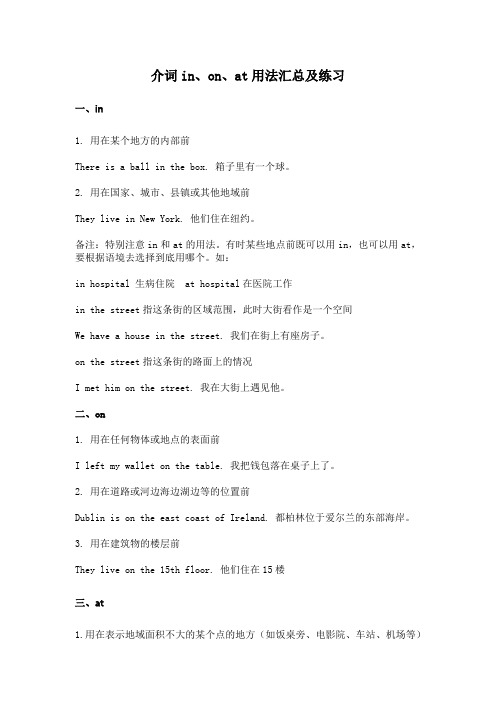
介词in、on、at用法汇总及练习一、in1. 用在某个地方的内部前There is a ball in the box. 箱子里有一个球。
2. 用在国家、城市、县镇或其他地域前They live in New York. 他们住在纽约。
备注:特别注意in和at的用法。
有时某些地点前既可以用in,也可以用at,要根据语境去选择到底用哪个。
如:in hospital 生病住院 at hospital在医院工作in the street指这条街的区域范围,此时大街看作是一个空间We have a house in the street. 我们在街上有座房子。
on the street指这条街的路面上的情况I met him on the street. 我在大街上遇见他。
二、on1. 用在任何物体或地点的表面前I left my wallet on the table. 我把钱包落在桌子上了。
2. 用在道路或河边海边湖边等的位置前Dublin is on the east coast of Ireland. 都柏林位于爱尔兰的东部海岸。
3. 用在建筑物的楼层前They live on the 15th floor. 他们住在15楼三、at1.用在表示地域面积不大的某个点的地方(如饭桌旁、电影院、车站、机场等)前I was sitting at my desk. 当时我正坐在课桌旁。
2. 把公司或工作场合看作一个点How many people are working at Microsoft? 有多人在微软工作?3. 用在很多人参与的活动场合前Were you at Lisa’s party/the cinema/the theatre? 你当时在丽莎的聚会上/电影院里/剧院里吗?4.用在地址门牌号前四、练习及解析1. Children get gifts ____ Christmas and ____ their birthdays.A. on; onB. at; onC. in; inD. in; on【答案】B【详解】句意:孩子们在圣诞节和生日时得到礼物。
at.in.on练习题附答案
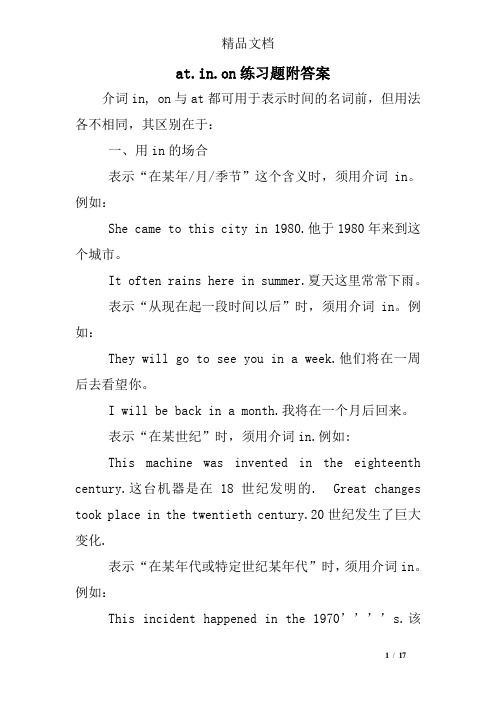
at.in.on练习题附答案介词in, on与at都可用于表示时间的名词前,但用法各不相同,其区别在于:一、用in的场合表示“在某年/月/季节”这个含义时,须用介词in。
例如:She came to this city in 1980.他于1980年来到这个城市。
It often rains here in summer.夏天这里常常下雨。
表示“从现在起一段时间以后”时,须用介词in。
例如:They will go to see you in a week.他们将在一周后去看望你。
I will be back in a month.我将在一个月后回来。
表示“在某世纪”时,须用介词in.例如:This machine was invented in the eighteenth century.这台机器是在18世纪发明的. Great changes took place in the twentieth century.20世纪发生了巨大变化.表示“在某年代或特定世纪某年代”时,须用介词in。
例如:This incident happened in the 1970’’’’s.该事件发生在20世纪70年代。
The Anti-Japanese War broke out in the 1930’’’’s.抗日战争爆发于20世纪30年代。
除此之外,morning / evening / afternoon 三个词也常跟介词in连用。
例如:Don’t watch TV too much in the evening.晚上看电视不要太多。
They sometimes play games in the afternoon.他们有时在下午做游戏。
二、用on的场合表示“在具体的某一天”或“早上、中午、晚上”等,须用介词on。
例如:Jack was born on May 10th,1982.杰克生于1982年5月10日。
英语语法介词in,on,at及其练习附答案
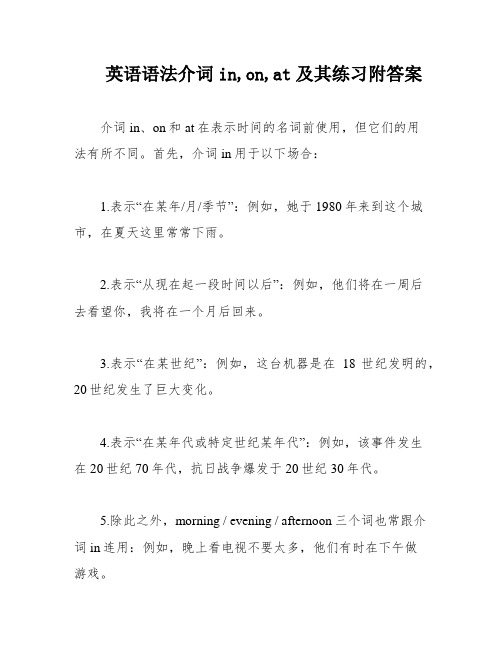
英语语法介词in,on,at及其练习附答案介词in、on和at在表示时间的名词前使用,但它们的用法有所不同。
首先,介词in用于以下场合:1.表示“在某年/月/季节”:例如,她于1980年来到这个城市,在夏天这里常常下雨。
2.表示“从现在起一段时间以后”:例如,他们将在一周后去看望你,我将在一个月后回来。
3.表示“在某世纪”:例如,这台机器是在18世纪发明的,20世纪发生了巨大变化。
4.表示“在某年代或特定世纪某年代”:例如,该事件发生在20世纪70年代,抗日战争爆发于20世纪30年代。
5.除此之外,morning / evening / afternoon三个词也常跟介词in连用:例如,晚上看电视不要太多,他们有时在下午做游戏。
其次,介词on用于以下场合:1.表示“在具体的某一天”或“(在具体的某一天的)早上、中午、晚上”等:例如,杰克生于1982年5月10日,他们是在一个雨天的早上离开的。
He returned to the United States one summer afternoon。
To indicate a specific day of the week or time of day。
the n "on" is used。
For example: We do not attend school on Saturdays and Sundays。
What time do you wake up on weekdays。
I heard this story on Saturday morning。
To indicate a specific holiday。
the n "on" is used。
For example: We usually eat mooncakes on theMid-Autumn Festival。
Mr。
Hu received a card on Teachers' Day.To indicate a specific time of day (i.e。
三年级英语介词at、in、on的用法单选题30题(含答案)

三年级英语介词at、in、on的用法单选题30题(含答案)1.We have an English class ____ eight o'clock.A.atB.inC.on答案:A。
“at”用于具体的时刻前,“eight o'clock”是具体时刻,所以用“at”。
“in”用于较长的时间段,如“in the morning”。
“on”用于具体的日期或星期几,如“on Monday”。
2.My birthday is ____ May.A.atB.inC.on答案:B。
“in”用于较长的时间段,“May”是月份,属于较长的时间段,所以用“in”。
“at”用于具体的时刻,“on”用于具体的日期或星期几。
3.We go to school ____ Monday.A.atB.inC.on答案:C。
“on”用于具体的日期或星期几,“Monday”是星期几,所以用“on”。
“at”用于具体的时刻,“in”用于较长的时间段。
4.I get up ____ the morning.A.atB.inC.on答案:B。
“in”用于较长的时间段,“the morning”是较长的时间段,所以用“in”。
“at”用于具体的时刻,“on”用于具体的日期或星期几。
5.We have a picnic ____ Sunday afternoon.A.atB.inC.on答案:C。
“on”用于具体的日期或星期几以及具体的某天的上午、下午或晚上,“Sunday afternoon”是具体的某天的下午,所以用“on”。
“at”用于具体的时刻,“in”用于较长的时间段。
6.The party is ____ six pm.A.atB.inC.on答案:A。
“at”用于具体的时刻,“six pm”是具体时刻,所以用“at”。
“in”用于较长的时间段,“on”用于具体的日期或星期几。
7.My father goes to work ____ the morning of Monday.A.atB.inC.on答案:C。
in、on、at练习及知识点解析

in/on/at练习及知识点解析单选题(5题,每题1分,共5分)第1题Children get gifts ____ Christmas and ____ their birthdays.A.on;onB.at;onC.in;inD.in;on第2题The English teacher told me to get there____ half past ten.A.inB.atC.onD.of第3题A lot of students in our school were born ____ March, 1981.A.inB.atC.onD.since第4题My grandfather was born ____ Oct. 10, 1935.A.onB.inC.atD.of第5题The train is starting ___ five minutes.A.inB.atC.forD.on填空题(9题,每题1分,共9分)第6题My friend now lives _____ Arizona.(我的朋友住在亚利桑那州。
)请输入答案:第7题Go down the street and take the first street _____ the right.(沿着这条街走,在第一条街向右转。
)Array请输入答案:第8题That's a beautiful pictures _____ the wall.(墙上的画很漂亮。
)Array请输入答案:第9题My friend lives _____ the island of Sardinia.(我朋友住在撒丁区的一个岛上。
)Array请输入答案:第10题He's the man _____ the front the room.(他就是站在房间前面的那个人。
)Array请输入答案:第11题I'll meet you _____ the shopping mall.(我在购物中心见你。
- 1、下载文档前请自行甄别文档内容的完整性,平台不提供额外的编辑、内容补充、找答案等附加服务。
- 2、"仅部分预览"的文档,不可在线预览部分如存在完整性等问题,可反馈申请退款(可完整预览的文档不适用该条件!)。
- 3、如文档侵犯您的权益,请联系客服反馈,我们会尽快为您处理(人工客服工作时间:9:00-18:30)。
时间介词in, on与at的用法介词in, on与at都可用于表示时间的名词前,但用法各不相同,其区别在于:一、用in的场合(1)表示“在某年/月/季节”这个含义时,须用介词in。
例如:She came to this city in 1980.他于1980年来到这个城市。
It often rains here in summer.夏天这里常常下雨。
(2)表示“从现在起一段时间以后”时,须用介词in。
例如:They will go to see you in a week.他们将在一周后去看望你。
I will be back in a month.我将在一个月后回来。
(3)表示“在某世纪”时,须用介词in.例如:This machine was invented in the eighteenth century.这台机器是在18世纪发明的.Great changes took place in the twentieth century.20世纪发生了巨大变化.(4)表示“在某年代或特定世纪某年代”时,须用介词in。
例如:This incident happened in the 1970''''s.该事件发生在20世纪70年代。
The Anti-Japanese War broke out in the 1930''''s.抗日战争爆发于20世纪30年代。
(5)除此之外,morning / evening / afternoon三个词也常跟介词in连用。
例如:Don't watch TV too much in the evening.晚上看电视不要太多。
They sometimes play games in the afternoon.他们有时在下午做游戏。
二、用on的场合(1)表示“在具体的某一天”或“(在具体的某一天的)早上、中午、晚上”等,须用介词on。
例如:Jack was born on May 10th,1982.杰克生于1982年5月10日。
They left on a rainy morning.他们是在一个雨天的早上离开的。
He went back to America on a summer afternoon.他于一个夏天的下午返回了美国。
(2)表示“在星期几”或“在星期几的早上、中午、晚上”等,须用介词on。
例如:We don't go to school on Saturday and Sunday.我们星期六和星期天不上学。
What time do you get up on weekdays?你在平日什么时候起床?I heard this story on Saturday morning.我是在星期六的早晨听到这个故事的。
(3)表示“在某一节日”时,须用介词on。
例如:We usually eat moon cakes on Mid-autumn Festival.我们通常在中秋节吃月饼。
Mr Hu received a card on Teachers' Day.胡老师在教师节那天收到了一张卡片。
三、用at的场合(1)表示“某一具体时刻(即几点几分时)”,须用介词at。
例如:He gets up at six o'clock every day .他每天六点起床。
I got home at five thirty yesterday afternoon.我昨天下午五点半到家。
(2)用在特定的时候(时节、时机)时,须用介词at。
例如:They were happy at that time.他们那时很幸福。
I think the shop is closed at this time of day.我认为商店在白天的这个时候关门了。
(3)表示“在中午、在夜晚、在周末”时,须用介词at。
例如:What do you often do at noon? 你中午经常做些什么?You can see many stars in the sky at night.夜晚你能看到天空中有许多星星。
(4)表示“在……岁”时,须用介词at。
例如:At the age of nine ,the boy could swim well.在九岁的时候,这孩子就游泳游得很好了。
At the age of twenty, I began to teach English at this school.在二十岁的时候,我就开始在这所学校教英语了。
注意:在含有next ,last, this, one ,any, each, every , some, all的词组和tomorrow, yesterday, the day after tomorrow, the day before yesterday 前不用任何介词。
例如:What did you do last summer holidays? 去年暑假你做了些什么?What are you going to do the day after tomorrow? 后天你打算做什么?练习( ) 1. Children get gifts ____ Christmas and ____ their birthdays.A. on; onB. at; onC. in; inD. in; on( ) 2.----There is nothing ____tomorrow afternoon, is there? -----No. We can have a game of table tennis.A. onB. inC. outD. up( ) 3. A lot of students in our school were born____March, 1981.A. inB. atC. onD. since( ) 4. He suddenly returned____ a rainy night.A. onB. atC. inD. during( ) 5. My grandfather was born____Oct. 10, 1935.A. onB. inC. atD. of( ) 6. The train is starting___five minutes.A. inB. atC. forD.still( ) 7. Mike does his exercises ____ seven _____ the evening.A. on; toB. at; inC. by; ofD. at; on( ) 8. Children wake up very early____the morning of Christmas Day.A. inB. onC. forD. at( ) 9 ____ a cold winter morning, I met her in the stfeet.A. InB. OnC. AtD. For( ) 10 It happened to be very cold____ the morning of our sports meeting.A. atB. onC. withD. of( ) 11. Why did you get up so early ___ this morning.A. onB. /C. atD. in( ) 12. He went to Shanghai___ September 3, 1991 and came back___ a cold morning last year.A. in; onB. on; inC. on; onD. in; ia( ) 13. Lucy was born____ the night of May 12, 1984. . ...A. onB. inC. atD. to( ) 14. Mrs Brown came to China ____ 1996.A.onB. ofC. to,D. in( ) 15 ___ the morning of November 20, 1915, the workers came to Chicago to show their mourning of Joe Hill.A. OnB. InC. OnD. At( ) 16. Ann moved___Hangzhou___September, 1992.A. /; inB. to; inC. to; on D, in; in( ) 17. They started off___an autumn afternoon.A. duringB. atC. inD. on( ) 18. He often goes ____ school ____ six thirty ____ the morning.A. for; to; inB. to; at; inC. to; for; at D, for; at; to( ) 19. He arrived ___ Shanghai ___ 9: 30 ___ March 5. A. at; in; at B. to; on; at C. in; on; at D. in; at; on( ) 20.The English teacher told me to get there____ half past ten.A: in B. at C. on D. of答案:B A A A A A B B B B B C A D B A D B D B。
